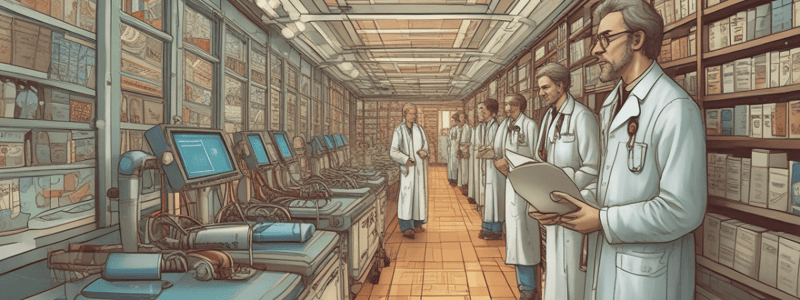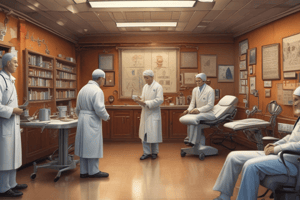Podcast
Questions and Answers
What is the primary purpose of establishing the source of history in a patient's evaluation?
What is the primary purpose of establishing the source of history in a patient's evaluation?
- To identify the patient's chief complaint
- To determine the patient's reliability
- To clarify the patient's occupation and marital status
- To ensure a written report is needed (correct)
Why is it important to document the time of history taking in an urgent or emergent setting?
Why is it important to document the time of history taking in an urgent or emergent setting?
- To ensure the patient's age is accurately recorded
- To prioritize the patient's chief complaint
- To establish a timeline for the patient's treatment (correct)
- To evaluate the patient's reliability and trust
What is the primary goal of creating intimacy during the history taking process?
What is the primary goal of creating intimacy during the history taking process?
- To put the patient at ease and facilitate open communication (correct)
- To assess the patient's chief complaint and prioritize treatment
- To identify the patient's occupation and marital status
- To establish a power dynamic between the clinician and patient
What type of questions is most effective for identifying a patient's chief complaint?
What type of questions is most effective for identifying a patient's chief complaint?
What is the primary purpose of the presenting complaint or chief complaint in the history taking process?
What is the primary purpose of the presenting complaint or chief complaint in the history taking process?
What is the primary purpose of inquiring about a patient's obstetric and menstrual history during a medical interview?
What is the primary purpose of inquiring about a patient's obstetric and menstrual history during a medical interview?
What is the key element in presenting a patient's history during a medical interview?
What is the key element in presenting a patient's history during a medical interview?
What is the primary goal of determining a patient's chief complaint during a medical interview?
What is the primary goal of determining a patient's chief complaint during a medical interview?
How should a healthcare provider approach the sexual history component of a medical interview?
How should a healthcare provider approach the sexual history component of a medical interview?
What is the primary benefit of referring back to a patient's previous medical history during later visits?
What is the primary benefit of referring back to a patient's previous medical history during later visits?
What is the primary goal of determining the patient's medication adherence?
What is the primary goal of determining the patient's medication adherence?
When assessing a patient's family history, what is the importance of identifying the age of onset of illnesses?
When assessing a patient's family history, what is the importance of identifying the age of onset of illnesses?
What is the purpose of asking about over-the-counter or 'non-traditional' medications in a patient's history?
What is the purpose of asking about over-the-counter or 'non-traditional' medications in a patient's history?
What should the healthcare provider do if the patient is missing doses or not taking medications as prescribed?
What should the healthcare provider do if the patient is missing doses or not taking medications as prescribed?
What is the significance of identifying anaphylaxis in a patient's allergy history?
What is the significance of identifying anaphylaxis in a patient's allergy history?
What percentage of diagnoses can be made based on the history alone?
What percentage of diagnoses can be made based on the history alone?
Why is good doctor-patient communication essential to good health care?
Why is good doctor-patient communication essential to good health care?
What does the statement 'Medical knowledge is a science but on the contrary medical practice is an art' imply?
What does the statement 'Medical knowledge is a science but on the contrary medical practice is an art' imply?
What is the primary objective of the medical interview?
What is the primary objective of the medical interview?
What is the main benefit of learning from patients in medical practice?
What is the main benefit of learning from patients in medical practice?
Flashcards are hidden until you start studying
Study Notes
The Doctor-Patient Bond
- Building a strong patient-physician bond is essential for a successful relationship.
- Showing genuine interest in the patient's life and health can improve the bond.
- Referring back to previous conversations and showing that you remember the patient can strengthen the bond.
Taking a Patient's History
- The patient's chief complaint is the reason they came to see the doctor.
- Determine the patient's age, occupation, and marital status.
- Ask open-ended questions to encourage the patient to share information.
Components of History Taking
- Presenting Complaint (Chief Complaint)
- History of Presenting Complaint
- Past Medical/Surgical History
- Family History
- Social History
- System reviews
History of Presenting Complaint
- When did the problem start?
- Were there any complications?
- Determine why a medical procedure was performed.
Medications
- Ask about prescription medications, including dose and frequency.
- Determine if the patient is taking medications as prescribed.
- Ask about over-the-counter or non-traditional medications.
Allergies/Reactions
- Ask about adverse reactions to medications.
- Identify the nature of the reaction.
Family History
- Ask about the health of the patient's parents and grandparents.
- Determine the age of onset of any illnesses.
- Ask about heritable illnesses among relatives.
Social History
- Ask about smoking habits, including number of packs per day and years smoked.
The Medical Interview
- Good doctor-patient communication is essential for good healthcare.
- Taking an accurate history is crucial for diagnosis.
- Medical knowledge is a science, but medical practice is an art.
Importance of History Taking
- 83% of diagnoses can be made based on the patient's history alone.
- Good communication skills are essential for building trust and making accurate diagnoses.
Studying That Suits You
Use AI to generate personalized quizzes and flashcards to suit your learning preferences.




